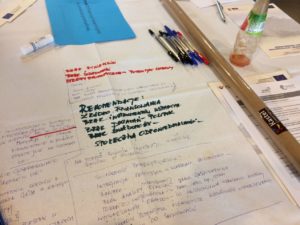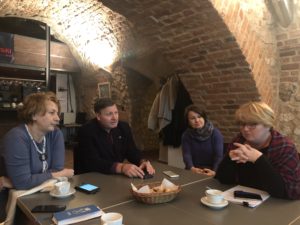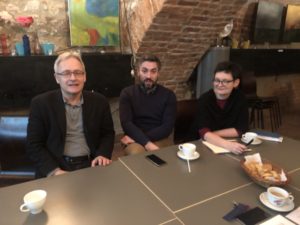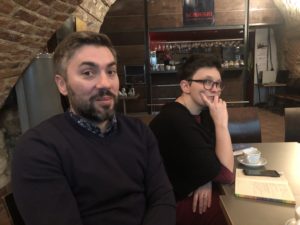On 11.02.2019, the next meeting of the Bio-economy and circular economy (GOZ) cluster platform took place at SPCleantech. During the meeting, Ms. Anna Młost from the Regional Policy Department presented the SYMBI project whose partner is the Marshal’s Office. In the second part of the meeting, prof. Joanna Kulczycka (AGH) presented the European Commission’s plans related to the GOZ and the possibilities of EU funding for joint projects.
The aim of the EU project in which the Regional Policy Department, SYMBI, participates is minimization of the amount of waste generated and even better use of secondary raw materials generated in industrial production.
SYMBI (Industrial Symbiosis for Regional Sustainable Growth and a Resource Efficient Circular Economy, or industrial symbiosis for sustainable regional development and resource efficiency in a circular economy) is an international project implemented under the INTERREG Europe program. Its partners are administrative bodies, scientific and non-governmental organizations from seven countries: Spain, Italy, Slovenia, Greece, Hungary, Finland and Poland.
The aim of SYMBI is to support public policies in regions striving for a circular economy model through increased resource efficiency and reduced greenhouse gas emissions. In December 2015, the European Commission presented an EU action plan on the circular economy. Waste proposals set a clear, ambitious and long-term strategy at all stages: from production through consumption, repair and recovery to waste management and the production of secondary raw materials that are put into circulation again in the economy.
As part of the SYMBI Małopolska project, he persuades to use the potential hidden in the re-use of waste. Also organizes a study visit during which the project partners will exchange experiences on waste treatment.
The budget of the whole project is almost 1.6 million euros. A part of the Małopolska Voivodship amounts to 147 thousand. euro (125 thousand euro from the European Regional Development Fund and 22 thousand euro from the voivodship budget).
The project is being implemented in 2016-2021.
SYMBI project partners:
FUNDECYT Foundation (Extremadura, Spain) – lead partner
2. Regional Ministry of Environment and Territorial Development (Andalusia, Spain)
3. Lesser Poland Voivodeship – Department of Regional Policy
4. Chamber of Commerce in Isernia (Molise, Italy)
5. Government Bureau for Development and European Cohesion Policy (Slovenia)
6. Kozani Commune – Development Office (Greece)
7. Pannon Novum Regional Innovation Nonprofit LTD (Hungary)
8. Häme Council (Finland)
9. Häme University of Applied Sciences Ltd (Finland).
Participants of meetings wanting to make a real contribution to the improvement of the degree of industrial symbiosis in the pursuit of a circular economy (GOZ) in Lesser Poland, are willing to share their own opinions and experience during consultation meetings on 4 documents developed as part of the SYMBI project implementation:
Comparative analysis of national and regional policies in the field of GOZ and industrial symbiosis.
Mapping of investment potential in the field of industrial symbiosis.
Catalog of good practices in the field of replacement of by-products and energy ecosystems.
Green public procurement as a stimulus for the development of industrial symbiosis.
Recommendations received from participants of consultation meetings were collected and forwarded to foreign SYMBI partners. Thanks to this, there will be an impact on the directions and speed of development of industrial symbiosis and GOZ in Małopolska, but also in partner regions: in Finland, Spain, Italy, Greece, Slovenia and Hungary.
The SYMBI project aims to support public policies in the pursuit of a circular economy model through the spread of industrial symbiosis. In addition, the project aims to support the implementation of instruments and actions to reduce production costs and mitigate pressure on the environment through increased resource efficiency and reduced greenhouse gas emissions.







